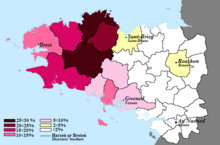Breton language
| Breton | |
|---|---|
| Brezhoneg | |

|
|
| Pronunciation | [bʁeˈzõːnɛk], [brəhõˈnek] |
| Native to | France |
| Region | Brittany (including Loire-Atlantique) |
| Ethnicity | Bretons |
|
Native speakers
|
210,000 in Brittany (2007) 16,000 in Île-de-France (Number includes students in bilingual education) |
| Dialects |
Gwenedeg Kerneveg Leoneg Tregerieg |
| Latin script | |
| Official status | |
|
Recognised minority
language in |
|
| Regulated by | Ofis Publik ar Brezhoneg |
| Language codes | |
| ISO 639-1 | br |
| ISO 639-2 | |
| ISO 639-3 | Variously: bre – Modern Breton xbm – Middle Breton obt – Old Breton |
|
Linguist list
|
xbm Middle Breton |
obt Old Breton |
|
| Glottolog | bret1244 |
| Linguasphere |
50-ABB-ba to -be)
|

Regional distribution of Breton speakers (2004)
|
|
50-ABB-b (varieties:
Breton /ˈbrɛtən/ (Brezhoneg IPA: [bʁeˈzõːnɛk] or IPA: [brəhõˈnek] in Morbihan) is a Southwestern Brittonic Celtic language spoken in Brittany.
Breton was brought from Great Britain to Armorica by migrating Britons during the Early Middle Ages; it is thus an Insular Celtic language, and as such not closely related to the Continental Celtic Gaulish language which had been spoken in pre-Roman Gaul. Breton is most closely related to Cornish, both being Southwestern Brittonic languages. Welsh and the extinct Cumbric are the more distantly related Brittonic languages.
The other regional language of Brittany, Gallo, is a langue d'oïl. Gallo is consequently close to French, although not mutually intelligible, and a Romance language descended from Latin (unlike the similarly-named ancient Celtic language Gaulish).
...
Wikipedia
